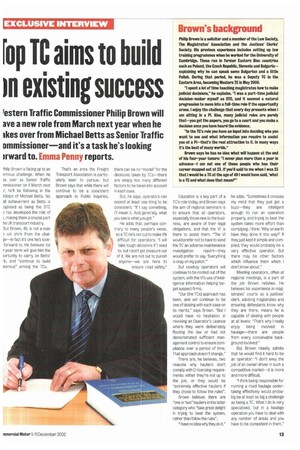Brown's background
Page 13

If you've noticed an error in this article please click here to report it so we can fix it.
Philip Brown is a solicitor and a member of the Law Society, The Magistrates Association and the Justices' Clerks' Society. His previous experience Includes setting up law training programmes when he worked for the University of Cambridge. These ran in former Eastern Bloc countries such as Poland, the Czech Republic, Slovenia and Bulgaria— explaining why he can speak some Bulgarian and a little Polish. During that period, he was a Deputy TC in the Eastern Area, becoming Western TO In May 2000.
"I spent a tot of time teaching magistrates how to make judicial decisions," he explains. "I was a part-time judicial decision-maker myself as DTC, and it seemed a natural progression to move into a full-time role If the opportunity arose. I enjoy the challenge that every day presents when I am sitting in a Pl. Also, many judicial roles are purely that—you get the papers, you go to a court and you make a decision once you have heard the evidence.
"In the TC's role you have an input into deciding who you want to see and what Information you require to assist you at a Pi—that's the real attraction to it. In many ways it's the best of many worlds."
Brown says he has no idea what will happen at the end of his four-year tenure: "I never plan more than a year in advance—I am not one of those people who has their career mapped out at 23.1f you'd said to me when I was 23 that I would be a TC at the age of 491 would have said, 'what Is a TC and what does that mean""
























































































































































